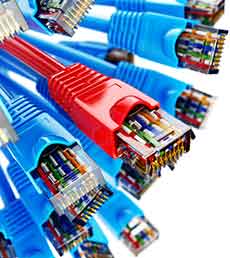When it comes to choosing the right cable on technology equipment’s, most of the casual users are unaware of the differences between Fiber optic and copper cables. Both of the wires has its own characteristics and advantages. However, in order to make flawless network connections, you must understand both concepts of cabling to select the perfect solution. To determine the perfect cabling system for your needs, let’s talk about Fiber vs. copper cabling.
- Cost: Whether you intended to use Fiber or Copper cabling, the first thing you should compare is the price. Although, a few years back, the price of Copper cables was cheaper than Fiber optics. However, the current price and availability of both medium are almost equal. Sometimes, it might depend on the geographic location.
- Bandwidth Capabilities: From the beginning of the data transmission, Copper cable is performing the precise transfer of the voice signal. However, transferring digital data using copper cable is not efficient enough as Fiber optics. Copper cable has a limited transmission capability while Fiber optic is able to provide up to 10Gbps transmission and beyond.
For an instance, right now if your ISP offers 100Mbps connection and promised to upgrade it to 1Gbps in the future. When you are using the current transmission speed, there will be no effect of whether you use Fiber or copper cabling. But, if they upgrade the connection to 1Gbps, copper cables won’t be enough to provide the maximum speed offered by your ISP. Thus, you would need to upgrade your connection from Copper to Fiber optics cabling.
- Reliability: As the copper cable use the speed of the electron to transmit data and Fiber optics uses the speed of a photon, you may understand the consequence of Fiber vs. copper cabling by now. The photon travels at a light speed where electrons travel less than one percent of the speed of light. Thus, Fiber optic is far more reliable than copper cable in every possible way of data transmission. If you are making a custom network connection between systems under the same roof, the copper cable may not lack any speed. But when you are about to transfer data to more than two kilometers distance, it will have a great deal of degradation compared to Fiber optics.
- Security: In order to complete data transmission, copper cable uses electricity which can be tapped to modify the signal. It also radiates the signal which is easy to tap. On the other hand, Fiber optics neither use electricity nor radiates any signal, thus can’t be tapped and difficult to overwrite. When the network connection runs on a government property, banks or institutions, security is a major concern and the unique properties of Fiber optics minimize the security flaws.
- Distance: Fiber optics has a low attenuation and better signal integrity than copper cables. Thus, for a long distance network connection, Fiber optics allows much longer transmission capabilities without slightly changing the actual frequency than with copper. Copper cabling can be accessed from a limited 100m distance where Fiber optics supports data transmission over 100 KM and beyond.
Above are the differences between Fiber Optic Cabling and copper cabling. Whether you are making connections for home or business, hope the comparison will assist you to determine the suitable cabling system.



